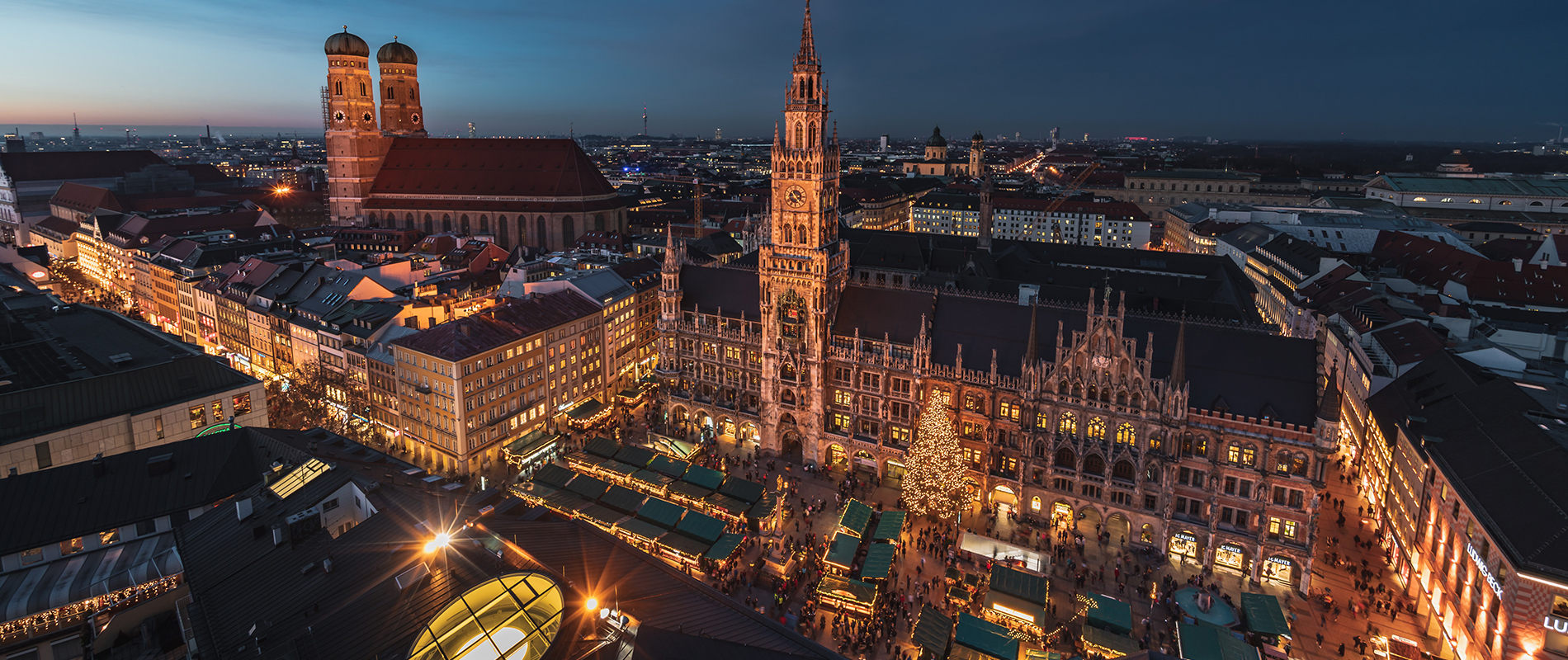
The Bavarian capital is in many ways a paradox, where modern advancement meets long-held traditions; where laptops meet lederhosen. Munich is a powerhouse of the German economy, home to the headquarters of more DAX-listed companies than any other city in Germany. However, the city’s industriousness does not detract from its charm. A clean, safe, walkable city, with expansive parks, pedestrian zones, bike lanes, and well-maintained infrastructure, as well as lakes and mountains on its doorstep, it is easy to understand why it consistently ranks as one of the world’s most livable cities. A hub for art and culture, with world class museums and a lively cultural scene, Munich somehow manages to offer all the benefits of any major metropolis while maintaining a small-town feel. It is this unique quality that led Germans to dub it a “Millionendorf” – a “village of a million people.” Virtually destroyed during World War II, the people of Munich took care to rebuild their city just as it was, preserving the original street plan and re-creating the Neo-Gothic facades and Neoclassical buildings that still characterize the Altstadt (Old Town) today. This historical area, located within the medieval city gates, is home to many of Munich’s most iconic sites, including the Residenz palace complex once home to the Wittelsbach dynasty, the National Theater, the Viktualienmarkt farmers market, and the twin onion domes of the famous Frauenkirche.
At the center of the Altstadt is the city’s main square, Marienplatz, whose northern side is dominated by the richly ornamented, neo-gothic exterior of the Neues Rathaus (New Town Hall). Below it, the bustling square plays host to an array of annual celebrations, the most beloved and atmospheric of which is Munich’s traditional Christkindlmarkt (Christmas Market). Every winter, at the start of Advent, Marienplatz is transformed by a dazzling array of festively decorated stalls which bound a glittering 100-foot Christmas tree and stretch out in every direction. Locals and visitors alike flock here to experience the magic and merriment of the city’s biggest Christmas Market, a proud Munich tradition whose origins date back more than 700 years.
Join Tasteful Croatian Journeys on a private, tailor-designed winter escape to discover Germany’s “Secret Capital,” – the surprising, delightful, and endlessly charming city of Munich.
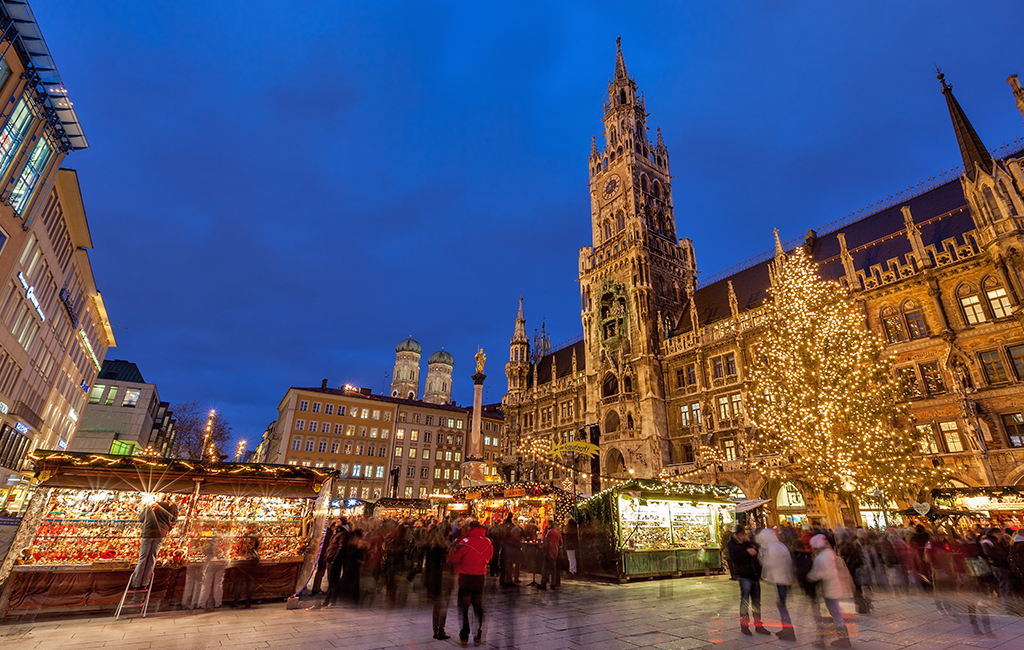
In addition to the central market in Marienplatz, Munich has more than 30 other smaller themed Christmas Markets sprinkled throughout the city and surroundings. These include the famed Kripperlmarkt (Crib Market or Manger Market) specializing in Bavarian and Tyrolean Nativity figures, a Medieval Market on Wittelsbacherplatz, the Pink Christmas Market organized by Munich’s gay and lesbian community, and the Munich airport’s Winterlicher Zauberlandschaft (Winter Wonderland). Truly, every inch of the city is brimming with yuletide cheer! Most of the markets still retain their traditional Bavarian character, with vendors offering a variety of handmade items from the region and beyond. Expect to find an array of Christmas decorations such as hand painted glass baubles or hand carved wooden ornaments, as well as candles, jewelry, ceramics, scarves, gloves, hats, and colorful paper star lanterns. For a truly authentic German souvenir, consider one of the traditional items from the Erzgebirge region, such as Nussknacker (nutcrackers), Räuchermänner (incense smoking men), Schwibbogen (candle arches) and Weihnachtspyramide (Christmas pyramids).
Bavaria has long had a reputation for hearty, comforting fare, to which Christmastime cuisine is no exception. Visitors will be delighted by the variety of Bratwürste ( pork sausages) on offer such as Nürnberger Rostbratwurst (finger-sized sausages flavored with marjoram), Thüringer Bratwurst (sausages flavored with marjoram, caraway, and sometimes garlic) and Käsekrainer (lightly smoked pork sausages stuffed with small cubes of Emmental cheese); typically served in der Semmel (on a roll). In addition, regional specialties such as Rahmfleckerl (flatbread made out of rye sourdough, topped with sour cream, bacon and scallions) and Reiberdatschi (potato pancakes) are sure to delight. Follow with a light and fluffy Dampfnudeln (sweet yeast dumplings) or chocolate covered Fruchtspieße (fruit skewer) for dessert. Lebkuchen (gingerbread) cookies make wonderful souvenirs, but be aware that not all varieties are intended to be eaten; the colorful heart shaped cookies are best kept as decoration. Aromatic Glühwein (mulled wine) is Germany’s most ubiquitous holiday beverage for good reason – but visitors seeking something with a bit more kick will want to try the Feuerzangenbowle. This unique libation translates literally to “fire-tongs punch,” its name derived from the process used to create it. A rum-soaked sugarloaf is set on fire, causing the sugar to melt and caramelize as it drips into mulled wine. Those brave enough to try it should head to Isartor, where a massive kettle brews up to 9,000 liters of the high proof punch.
Christmas in Munich is a traditional affair, sure to evoke a sense of childlike wonder and wide-eyed enchantment from all who experience it. The atmosphere of the Marienplatz Christmas Market is particularly nostalgic, its ambiance enriched by a festive soundtrack of holiday music performed live every evening by soloists, choirs, wind bands, and vocal trios from the balcony of the Neues Rathaus. Regional folklore takes center stage each year during the annual Krampuslauf (Krampus Run), a rowdy procession of elaborately costumed performers depicting the mythological half-goat, half-demon creature, Krampus. This menacing character is said to be the counterpart of good St. Nicholas, charged with punishing children who misbehave. Many small, regional Krampus Runs take place throughout the month of December in Germany and Austria, however Munich’s is truly a sight to behold, with more than 300 participants charging through the main square in hand-carved wooden masks and wooly pelts. The event normally takes place in early December, close to St. Nicholas’ Day on December 6th. Those seeking to stray from tradition may enjoy the lively, international vibe of the Winter Tollwood market, located at the Theresienwiese, which is also the site of Oktoberfest. The colorful tents of the market are known for their party-like atmosphere, lively concerts, beautifully quirky crafts, and international cuisine.
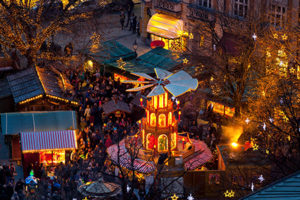
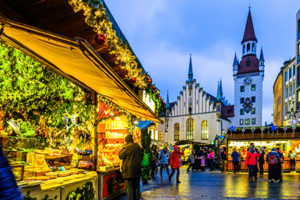
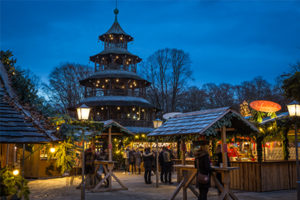
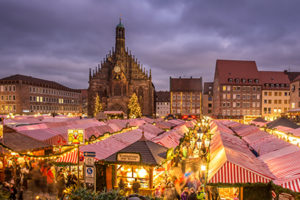
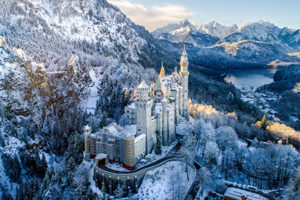
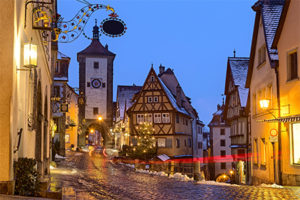
Most of Munich’s citywide Christmas Markets open during the last week of November and end on December 24th, though some, like Winter Tollwood, remain open until December 31st. Specific dates vary from year to year and market to market.
